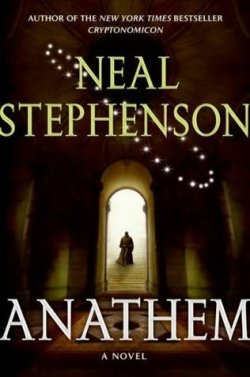Neal Stephenson’s Anathem is a 2009 Hugo Award nominee for Best Novel.
Anathem (HarperCollins) is one of those polarizing books. Some people hate it. I love it enthusiastically. That doesn’t mean I love it uncritically. I can read the negative reviews and see what they see. Adam Roberts‘s review in particular is hilarious because it’s true that it’s very long and has a lot of made up words. The thing is that is doesn’t matter.
Anathem is a hugely ambitious book that does indeed fail in some of what it’s trying to do. Where it succeeds it succeeds so brilliantly that I don’t care whether the physics makes sense or even whether there are any female characters. What Anathem is attempting is to write about the whole development of science and philosophy in a world similar but different from ours, and then extend it forward from here to cover four thousand more years of future. He does this in a way that’s utterly immersive and absorbing—in the first person point-of-view of an appealingly obsessive geeky young man. Stephenson sets up the world of the Maths, closed communities of geek-minded people who take themselves out of the world in the manner of monasteries, but instead of worshipping God they’re withdrawing to study abstract science. He makes this absolutely fascinating and absorbing with detail piled on detail—the one year Maths, the ten year ones, the century ones, the mysterious Millenial ones that only open once a century, and did I mention that the monasteries are also giant clocks that have to be wound?—and then he tells a first contact story set in that world. But the main thing the book is doing is showing how science itself works, the scientific method, and how that is in itself exciting and engaging and fun. That’s a real achievement.
Of course, it’s also a lovely long book I can sink into completely and pull up over my head like a warm fluffy blanket. I’ve never really liked the word “cool” because it implies a certain coldness. What’s wonderful about Anathem is how hot and passionate it is about abstractions.
I can’t get enough of the angle on time the Maths encourage, and the way the people are so totally adorable. Erasmas is only nineteen, but he quite naturally comes out with things like:
When there’s an economy extramuros, we can sell the honey outside the Day Gate and use the money to buy things it’s difficult to make in the concent. When conditions are post-apocalyptic, we can eat it.
or:
For three thousand years it had been the concent’s policy to accept any or all folding chairs and collapsible tables made available to it, and never throw any away. … We had folding chairs made of aluminum, bamboo, aerospace composites, injection-molded poly, salvaged rebar, handcarved wood, bent twigs, advanced newmatter, tree stumps, lashed sticks, brazed scrap metal and plaited grass.
and then there’s this conversation between Orolo and a man from outside:
“Do you have, in your wigwams or tents or skyscrapers or wherever you live—”
“Trailers without wheels, mostly,” said Artisan Quin.
“Very well. In those, is it common to have things that think, but are not human?”
“We did for a while but then they all stopped working and we threw them away.”
Or there’s Fraa Jad:
“The aliens are jamming the nav satellites,” I announced.
“Or maybe they just shot them down!” said Barb.
“Let’s buy a sextant, then,” suggested Fraa Jad.
“Those have not been made in four thousand years,” I told hin.
“Let’s build one then.”
“I have no idea of all the parts and whatnot that go into a sextant.”
He found this amusing. “Neither do I. I was assuming we’d design it from first principles.”
“Yeah,” snorted Barb. “It’s just geometry, Raz!”
“In the present age, this continent is covered by a dense network of hard-surfaced roads replete with signs and other navigational aids,” I announced.
“Oh,” said Fraa Jad.
“Between that and this”—I waved the cartalba—”we can find our way to Saunt Tredegarh without having to design a sextant from first principles.”
Fraa Jad seemed a little put out by this. A minute later, though, we happened to pass an office supply store. I ran in and bought a protractor, then handed it to Fraa Jad to serve as the first component in his homemade sextant. He was deeply impressed. I realised that this was the first thing he’d seen extramuros that made sense to him.
Reading Anathem is a process of becoming deeply immersed in a world and culture in which designing a sextant from first principles may not be necessary, but it’s a perfectly reasonable first thing you think of. If this is appealing, you’ll probably like the book. All the major characters are wildly passionate about ideas, all the time. They care deeply about abstractions to such an extent that while saving the world and getting the girl happen, they’re really not the point of the book.
This is definitely one of the best books of this year, or any year.
Jo Walton is a science fiction and fantasy writer. She’s published eight novels, most recently Half a Crown and Lifelode, and two poetry collections. She reads a lot, and blogs about it here regularly. She comes from Wales but lives in Montreal where the food and books are more varied.










